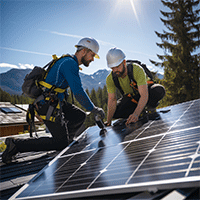Hawaii solar incentives, tax credits and rebates
Resources for going solar in 2023

After tax credits, the average system costs $10,280 in Hawaii, which is cheaper than in many other states. The national average is $16,715.
“Going solar is a no-brainer as an investment,” one solar customer in Haiku said. “You get a huge tax break and save big bucks over time.” Unlike some other states, Hawaii offers great incentives, like property tax exemptions and zero-interest loans for residents.
Key insights
- You can take advantage of solar tax breaks, rebates and loan programs when going solar in Hawaii.
- The average federal tax credit value is $4,406 in Hawaii.
- Estimated 25-year savings are $49,459 with solar panels.
Solar incentives in Hawaii
When it comes to saving money on your solar setup, the federal solar investment tax credit (ITC) is the best way to cut costs for solar in the Aloha State. Homeowners who get their solar system up by the end of 2032 can knock 30% off the total cost through the tax credit.
This includes equipment, labor and permits. Say your whole setup comes to $10,000. You’ll get a $3,000 credit when tax time rolls around.
The ITC drops to 26% in 2033 and 22% in 2034.
You don’t get these benefits automatically, though. You have to claim your solar equipment, labor and permits on your federal taxes for the same year you started using your system on Form 5695.
Statewide residential solar incentives in Hawaii
Hawaii has many solar incentives residents can use to make it easier to switch to solar energy. These include agricultural, residential and commercial tax credits, loan programs and rebates. Some are area-specific, though, so make sure to check if they are covered on your island.
State solar incentives in Hawaii
| Incentive type | Incentive amount | Applicable sectors | Administrator | Available statewide | |
|---|---|---|---|---|---|
| Solar and Wind Energy Credit | Tax credit | 35% | Commercial, residential, multifamily residential | Hawaii Department of Taxation | |
| Solar Water Heater Rebate | Rebate program | Varies | Commercial, residential | Hawaii Energy | |
| Solar Water Heating Loan Program | Loan program | Zero-interest loan or $1,500 | Residential, multifamily residential | County of Kauai Housing Agency | |
| Solar Water Heating Rebate Program | Rebate program | $1,500 | Commercial, residential | Kauai Island Utility Coop | |
| Solar Loan Program | Loan program | Zero interest | Residential | City and County of Honolulu | |
| Priority Permit Processing for Green Buildings | Green building incentive | Priority processing | Commercial, construction, industrial, residential, installers/contractors | State of Hawaii | |
| Farm and Aquaculture Alternative Energy Loan | Loan program | $1,500,000 or 85% of cost | Agricultural | Hawaii Department of Agriculture | |
| Real Property Tax Exemption for Alternative Energy Improvements | Property tax incentive | 100% exemption for value of solar system for 25 years | Commercial, industrial, residential | City and County of Honolulu, Real Property Tax Assessment Division | |
| GreenSun Hawaii | Loan program | Varies by lender | Commercial, industrial, nonprofit, residential, multifamily residential | Hawaii Community Reinvestment Corporation |
Tax breaks
Hawaii has two tax breaks for solar. The Solar and Wind Energy Credit is a state tax credit for 35% of the cost of equipment and the installation costs of solar thermal or photovoltaic (PV) heating systems, including water heaters, installed on residential or commercial buildings.
The City and County of Honolulu also offer a solar property tax exemption for its residents. This exemption lets you avoid paying additional property taxes for the value added by your solar energy system. It applies to commercial, industrial and residential buildings.
» LEARN MORE: The tax benefits of owning a home: must-know deductions and secrets
Rebates
Hawaii Energy and Kauai Island Utility Cooperative both have solar water heater rebate programs. With Hawaii Energy, homeowners can choose between a rebate of $1,250 or a $1,250 interest rate buydown. You must live in Hawaii, Honolulu or Maui counties to qualify.
Kauai Island Utility Cooperative Members is offering a $1,500 rebate or a zero-interest loan to members who want to purchase a solar water heater.
Loan programs
If you’re a Hawaii resident looking for a solar loan, then there are plenty of options.
- City and County of Honolulu – Solar Loan Program: This loan is income-based and offers zero-interest loans to homeowners. You can also include money required for roof repairs in your loan.
- Farm and Aquaculture Alternative Energy Loan: This is a 40-year term loan for those in the agriculture sector. It offers a maximum loan of $1,500,000 or 85% of project costs (whichever is less) at a 3% interest rate for agriculture and a 5% interest rate for aquaculture.
- GreenSun Hawaii: This program helps lenders offer loans for solar water heating systems, heat pumps and solar photovoltaic systems to homeowners and nonresidential properties. The terms differ from lender to lender.
What to know about net metering in Hawaii
Net metering is when a solar system produces more electricity than is consumed and sends the excess back to the electric grid. The homeowner receives a credit on their utility bill for any energy sent to the grid.
In Hawaii, net metering has unique attributes because of different local utility rates and interconnection standards. Utility companies operating in the state, including Hawaiian Electric (HECO) and Kauai Island Utility Cooperative, each has its specific rates and policies.
Hawaii has implemented a program called Customer Grid-Supply (CGS) that lets you sell excess solar energy back to the grid at a predetermined rate. The rate per kilowatt hour (kWh) is determined by what island you live on. Another option, the Customer Self-Supply (CSS) program, lets you store excess energy in batteries for personal use.
A few stipulations and rules apply to net metering in Hawaii. You still have to pay a $25 minimum monthly bill for as long as you’re connected to the power grid, even if you produce 100% of your electricity.
Solar resources in Hawaii
Below are some additional resources that can guide you through transitioning to solar in Hawaii.
- Customer Grid-Supply, Hawaiian Electric
- Solar Energy, Hawaiian Electric
- Hawaii Energy Efficiency Programs, Rebates and Solar Initiatives
- Hawaii Green Energy Money Saver (GEM$) On-Bill Program
- Hawaii Energy’s Clean Energy Allies
- Hawaii Renewable Energy Resources
- Fighting Climate Change in Hawaii with Solar Energy
» GUIDE: Solar panel installation
Find solar companies in Hawaii
Compare popular solar companies available in Hawaii below. Read our guide to finding the best solar companies for more.
| SunPower | Sunrun | Tesla Energy | |||||
|---|---|---|---|---|---|---|---|
| Primary | SunPower | Read reviews | Customer Ratings 4.3 | Free quote | Payment options
Cash, loan, lease
| Warranty
10 to 25 years
| |
| Primary |  | Sunrun | Read reviews | Customer Ratings 4.1 | Free quote | Payment options
Cash, loan, lease
| Warranty
25 years
|
| Primary |  | Tesla Energy | Read reviews | Customer Ratings 2.2 | Free quote | Payment options
Cash, lease, loan
| Warranty
25 years (system)
|
FAQ
Can I get solar panels for free in Hawaii?
No, but you can lease or enter a PPA with minimal upfront costs. There are also plenty of zero-interest loan options and tax rebates offered in Hawaii to make solar more affordable.
How much can I save with solar panels in Hawaii?
In Hawaii, the average savings is $49,459 over 25 years. Even if your solar doesn’t cover all of your energy needs, you still stand to save a lot by adding a system to your home.
Are there any disadvantages to going solar in Hawaii?
Some residents who switch to solar have a few complaints, mostly related to customer service and issues with ongoing monitoring.
It can also take a long time, according to Richard in Captain Hook: “Setting up my solar took too long. From start to finish, it was about a year. I think getting permits and moving through the government procedure could’ve been a lot faster.”
» MORE: Solar energy pros and cons
Can I put solar panels on my condo?
This depends on your condo rules and regulations.
Is my HOA allowed to restrict solar panels?
Homeowners associations in Hawaii are not allowed to restrict solar panel usage, according to the Hawaii state legislature.
How can I pay for solar panels?
Other than paying cash, you can finance solar panels. Hawaii offers many solar loan options, and some of them are even interest-free. Other options include leasing or getting a PPA.
» SOLAR PANELS: Lease vs. buy
Bottom line: How much are solar panels in Hawaii?
On average, solar panels are less expensive in Hawaii than in other states. Your estimated savings are higher than in many other states, too. Residents also have access to some great incentives like zero-interest loans, property tax exemptions and help paying for solar heating.
The ConsumerAffairs research team conducted an in-depth analysis to determine how much it costs to go solar in Hawaii and the average solar costs in other states.
Solar costs: Hawaii vs. other states
| Average cost per watt | Typical system size | Upfront cost* | ITC value (30%) | Payback period** | Estimated net savings | |
|---|---|---|---|---|---|---|
| Hawaii | $2.67 | 5.5 kW | $14,686 | $4,406 | 6 years | $49,459 |
| California | $2.73 | 4.5 kW | $16,380 | $4,914 | 8 years | $30,000 |
| Arizona | $2.61 | 11.5 kW | $30,015 | $9,004 | 12 years | $23,891 |
| Nevada | $2.52 | 10 kW | $25,200 | $7,560 | 12 years | $18,319 |
| New Mexico | $2.68 | 7 kW | $18,760 | $5,628 | 12 years | $15,413 |
Article sources
- DSIRE, “ Hawaii Programs .” Accessed Aug. 25, 2023.
- EcoWatch, “ Solar Panel Cost in Hawaii. ” Accessed Aug. 25, 2023.
- United States Environmental Protection Agency, “ Summary of Inflation Reduction Act provisions related to renewable energy .” Accessed Aug. 25, 2023.
- Solar Energy Industries Association, “Hawaii Solar.” Accessed Aug. 25, 2023.
- DSIRE, “ Hawaii Solar Programs .” Accessed Aug. 25, 2023.
- Hawaii Department of Commerce and Consumer Affairs, “ Public Utility Company Web Sites .” Accessed Aug. 25, 2023.
- Hawaii State Energy Office, “ Hawaii Energy Facts & Figures ,” Accessed Aug. 25, 2023.
You’re signed up
We’ll start sending you the news you need delivered straight to you. We value your privacy. Unsubscribe easily.
